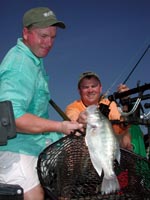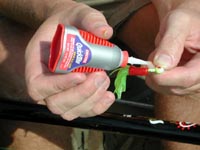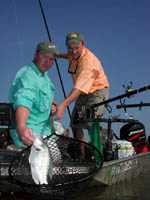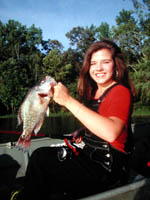
|
Features
|
|
|
|
Books
|
|
|
|
Fun & Games
|
|
|
|
Contact Us
|
|
|
John's Journal... Entry 208, Day 3
KENT DRISCOLL ON POWER TROLLING FOR CRAPPIE
Patterns for Power Trolling and More on Equipment
 EDITOR'S
NOTE: Kent Driscoll of Cordova, Tennessee, enjoys
crappie fishing so much that he fishes the Crappie U.S.A. and North American
Crappie tournament trails and belongs to the Troll Mate Crappie Club in
Memphis, Tennessee. For the next two weeks, I'll tell you about the tactics
Driscoll employs for the summer months to take suspended crappie - power
trolling and crankbaiting. This week we'll learn about power trolling
for crappie.
EDITOR'S
NOTE: Kent Driscoll of Cordova, Tennessee, enjoys
crappie fishing so much that he fishes the Crappie U.S.A. and North American
Crappie tournament trails and belongs to the Troll Mate Crappie Club in
Memphis, Tennessee. For the next two weeks, I'll tell you about the tactics
Driscoll employs for the summer months to take suspended crappie - power
trolling and crankbaiting. This week we'll learn about power trolling
for crappie.
Question: How do you establish a pattern when you're
power trolling for crappie?
Answer: I identify a pattern by simply starting to fish. Every time we
catch a fish, we pay attention to what bait we caught it on and how deep
the crappie was. Then we try to mimic that pattern on every pole.
Question: Once you establish that pattern and go back
and run that pattern, do you run the same water with the pattern, or do
you run new water?
Answer: I'll run both. I'll run water where we have already caught fish,
but I'll also break new ground and run new water as well.
Question: You fish open/flat water - right?
Answer: Yes, I fish open/flat water with no structure, nothing, because
these crappie are out here with the baitfish.
 Question:
Most people aren't fishing for open-water crappie or suspended ones, are
they?
Question:
Most people aren't fishing for open-water crappie or suspended ones, are
they?
Answer: Most crappie fishermen call this type of fishing the Mississippi
power-trolling technique. The crappie fishermen south of Memphis, Tennessee,
in Mississippi have taken this idea, developed it and fine-tuned it. I've
seen how effective it is, so I've learned how to do it and applied it
to tournament situations. Many tournament anglers don't fish with a power-trolling
system, but I think the procedure is getting more popular every day.
Question: Why don't more people start power trolling
for crappie?
Answer: Well, power trolling is more difficult. For one thing, you'll
have a lot of rods to fish. Too, power trolling has many variables, whereas
regular crappie fishing takes just a jig and/or a minnow. Power trolling
takes more time to set up. However, I know at the end of the day the kind
of reward I'll have from fishing this technique.
Question: Where do you find all the racks to hold these
poles?
Answer: My rod holders are Titelocks. I've had these rod holders for years.
I like these rod holders. I actually made the stand and the base myself
to hold these heavy-duty rod holders. When I bought the original rod-holder
Titelock system, it wasn't built to hold rods and heavy weights moving
this fast. So, I designed my own. As you see, I've got four bolts on the
floor and then 1-inch tubing to make a T-post to support the rods and
the rod holders. I can run as much weight as I want to off this -- by
far the strongest trolling system ever.
 Question:
How many fish do you expect to catch per day when you use this system?
Question:
How many fish do you expect to catch per day when you use this system?
Answer: When the bite is good, we'll each catch a 30-crappie limit in
three to four hours.
Question: Do these fish have to be 10-inches long?
Answer: Mississippi lakes generally have a 10-inch-length limit.
Question: What's your opinion of the 10-inch limit?
Answer: I think the 10-inch-length limit for crappie is great for these
lakes. The length limit keeps people from keeping the small fish and gives
these fish a chance to grow bigger. I can tell by fishing other states
that don't have length limits on their crappie that they don't have the
big crappie that Mississippi does.
Question: Have you ever caught many crappie weighing
more than 3 pounds?
Answer: I've taken four crappie that weighed more than 3-pounds each,
I've caught two that weighed exactly 3-pounds each, and I've also taken
a 3.2- and a 3.4-pound crappie. I've been fishing for crappie for more
than 20 years. A 3-pound crappie is pretty rare, but this lake I enjoy
fishing, 28,000-acre Lake Arkabutla, about 10-miles south of Hernando,
Mississippi, on I-55, is renowned across the crappie-fishing world for
homing big crappie. Lake Arkabutla is a very fertile lake that's fed by
a cold-water river on one side and Hurricane Creek on the other side.
 Question:
You keep a counter on your pole stand, right?
Question:
You keep a counter on your pole stand, right?
Answer: Yes, I do. I keep up with how many crappie have been caught. Then,
we don't have to count them during the day. Every time we catch a crappie
and put it into the livewell or cooler, I just click our counter one time.
I also use the counter in tournaments. For instance, on the North American
Crappie tournament circuit, we can't have more than 20 crappie in the
livewell at any time. So, we have to keep up with the number we have on-hand
to not break the rules.
Question: What else are you going to catch when you're
power trolling like this?
Answer: We'll catch some of most every kind of fish. Mainly we'll take
crappie though. We'll also catch a few white bass and catfish and occasionally
a largemouth.
To learn more about Lake Arkabutla, Driscoll's favorite crappie-trolling lake near Hernando, Mississippi, go to www.visitmississippi.org, or call (800) WARMEST. You also can go to www.hernandoms.org or call the chamber of commerce at (662) 429-9055, or check out the Days Inn in Hernando at (662) 429-0000, or see www.thedaysinn.com.
TOMORROW: WHAT DRISCOLL HAS LEARNED ABOUT CRAPPIE
Check back each day this week for more about KENT DRISCOLL ON POWER TROLLING FOR CRAPPIE ...
Day 1 - Driscoll's Equipment
Day 2 - More on Power-Trolling Equipment
Day 3 - Patterns for Power Trolling and More
on Equipment
Day 4 - What Driscoll Has Learned About Crappie
Day 5 - More on Equipment